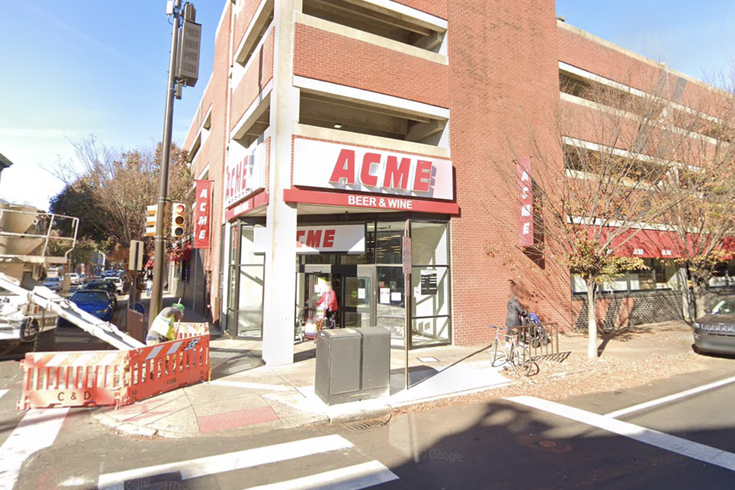
October 14, 2022
 Streetview/Google Maps
Streetview/Google Maps
Acme Markets, pictured above on South Street in Philadelphia, is one of nearly two-dozen grocery chains operated by Boise, Idaho-based Albertsons. Kroger announced Friday it plans to acquire Albertsons in a $24.6 billion merger deal.
Albertsons Companies, the owner of grocery store chain Acme Markets, will be acquired by competitor Kroger in a deal worth $24.6 billion, the companies announced Friday.
They are the two largest supermarket chains in the United States, making it likely their proposed merger will raise antitrust flags for federal regulators.
The definitive agreement reached by the companies would involve Kroger acquiring all of Albertsons' common and preferred stock for an estimated $34.10 per share, about 20% higher than the close of Albertsons stock on Thursday. The $24.6 billion figure includes approximately $4.7 billion in Albertsons debt.
Acme Markets is one of more than a dozen grocery store brands owned by Albertsons, whose other banners include Safeway, Vons, Shaw's and Jewel-Osco. Kroger's biggest supermarket brands include Dillons, Ralphs and Harris Teeter.
Albertsons, based in Boise, Idaho, has approximately 2,200 supermarkets, including more than 150 Acme stores operating in Pennsylvania, New Jersey, Delaware, Maryland, New York and Connecticut. Kroger, based in Cincinnati, has roughly 2,750 stores.
Together, the two companies employ more than 710,000 people and they operate a combined 66 distribution centers, 52 manufacturing plants, 3,972 pharmacies and 2,015 fuel centers.
"We are bringing together two purpose-driven organizations to deliver superior value to customers, associates, communities and shareholders," said Kroger chairman and CEO Rodney McMullen, who would oversee the combined company.
In announcing the agreement, Kroger touted its track record of reducing prices for consumers and raising wages for its associates. The company said it plans to brings those benefits to Albertsons brands, reinvesting approximately half a billion dollars in cost savings from the merger to lower prices for customers. Kroger also said it plans to invest $1.3 billion in Albertsons stores to improve the customer experience.
But some consumer protection groups, including the American Economic Liberties Project, pushed back against the idea that a merger will help shoppers or workers at the two companies.
“There is no reason to allow two of the biggest supermarket chains in the country to merge — especially with food prices already soaring,” Sarah Miller, executive director of the AELP, said Friday. “With 60% of grocery sales concentrated among just 5 national chains, a Kroger-Albertons deal would squeeze consumers already struggling to afford food, crush workers fighting for fair wages, and destroy independent, community stores. This merger is a cut and dry case of monopoly power, and enforcers should block it.”
Other major players in the U.S. grocery space are Walmart, Amazon, Target and Ahold Delhaize. Walmart and Amazon, in particular, have aggressively expanded their respective footprints in the industry by building new distribution centers and warehouses and developing their online ordering platforms.
In a merger, Kroger and Albertsons could both end up selling off some of their stores, a possibility that Albertsons already had been considering earlier this year. In March, Albertsons undertook a strategic review of its business strategy in conjunction with financial advisors Goldman Sachs and Credit Suisse.
Albertsons went public in 2020, led by investment firms Cerberus Capital Management and Philadelphia-based Lubert-Adler Partners, which together own about half the company's shares and were integral to Albertsons' expansion during the 2000s.
At the time of the review, industry analysts predicted that Albertsons would divest underperforming stores in order to invest in its supply chain, e-commerce growth and technology upgrades to increase automation and delivery service capacity.
It's unclear how a merger might affect Acme stores, including whether the brand's locations might be reduced or the name changed.
Federal Trade Commission chair Lina Kahn told The New York Times that the agency is skeptical that selling off stores would be sufficient for Kroger and Albertsons to avoid antitrust scrutiny.
Acme has been among the most recognizable markets in the Delaware Valley for decades, with roots tracing back to South Philadelphia during the late 19th century and the formation of the American Stores chain of grocers. The company's Acme brand became prominent in the early 1960s and changed hands with the Albertsons acquisition in 1999.
Acme has 15 stores in Philadelphia and a significant presence in the surrounding suburbs, particularly in Montgomery and Delaware counties. The company has faced growing competition from competitors like Giant and Aldi. Amazon Fresh also has made moves to open more than half a dozen stores in the Philadelphia area in the coming years.
Vivek Sankaran, Albertsons' CEO, seemed to suggest Friday that many of the company's brands would survive a merger. In terms of store locations, Acme is third behind Safeway and Jewel-Osco in the Albertsons portfolio.
"Together with Kroger, our combined iconic banners will be able to provide customers with even more value and greater access to fresh food and essential pharmacy services," Sankaran said. "Given the similarities in the culture and values at Kroger and Albertsons Cos., I am confident that the combination will also have a positive impact on our associates and the communities we are proud to serve."